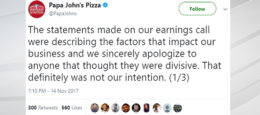


Better Ingredients. Better Pizza. Bad Apologies: Papa John’s
By Thom Fladung/Hennes Communications
Papa John’s has delivered the latest example of a too-little, too-late, too-lame apology.
As noted just about everywhere, including CNN, Papa John’s attempted to apologize on Twitter, in a series of tweets, after CEO John Schnatter said on an earnings call that sales of the official pizza of the NFL have been tanking because of how the league has dealt with its players kneeling during the National Anthem to protest racial injustice and police violence.
“The NFL has hurt us by not resolving the current debacle to the players’ and owners’ satisfaction of all parties…” Schnatter said on the conference call with investors. “This should have been nipped in the bud a year and a half ago. The controversy is polarizing the customer, polarizing the country.”
He’s right about it polarizing at least some of the country. The protests have been the latest high-profile event exposing the country’s divisions in a deeply emotional time. But who knew it also has been hurting pizza sales? Now, that’s a problem.
Schnatter’s comments quickly drew critics who pointed out the absurdity of using such an emotional debate to complain about how many pies he’s selling while also seeming to oppose the rights of the protesters. Meanwhile, Pizza Hut said its sales were fine. And Digiorno quickly took to Twitter to boast of its business results, adding: “Better pizza. Better sales.” Papa John’s did draw some support – from neo-Nazis as the Daily Stormer named it “the official pizza of the alt-right.”
Finally, the inevitable apology came from Papa John’s, via Twitter: “The statements made on our earnings call were describing the factors that impact our business and we sincerely apologize to anyone that thought they were divisive. That definitely was not our intention.” And in another tweet: “We will work with the players and league to find a positive way forward. Open to ideas from all. Except neo-nazis” with a middle-finger emoji offered to “those guys.”
How did Papa John’s manage to screw up saying “I’m sorry”? How many slices would you like?
- The company waited two weeks after the earnings call to apologize. Did it take that long to write the tweets? In our social media era, crises erupt in seconds. Be prepared to respond in kind. Of course, Papa John’s has since been criticized for waiting so long. And, of course, Papa John’s has followed up its apology by apologizing for waiting so long. At the least, if you waited too long, say that as well in the original apology.
- Saying “we sincerely apologize to anyone that thought they (the original comments) were divisive” is a classic non-apology apology. Are you sorry that I feel bad? Or sorry for what you did? Do you, on reflection, think the comments were divisive? Then say simply that. “I’m sorry I offended you” is not an apology. It’s pouring more fuel on the fire.
- Focus on the apology. And promising to take action is a good idea – if you are in a position to do so. But stay in your lane. A pizza company promising to work with the players and the league to find a way forward? Has anyone asked for that? As CNN and others noted, this quickly drew new criticism, like this, from a Twitter user: “You don’t need to ‘work with’ them. They want to protest. They don’t need your permission or to compromise to benefit you.”
There is a better way.
A wonderful Harvard Business Review story, written in 2015, suggests that the key components to an effective apology include: candor, remorse, commitment to change and sincerity.
For a deeper dive, including research that shows how effectively saying “I’m sorry” has worked in the healthcare industry, check out www.sorryworks.net.
Everyone makes mistakes. And just about everyone understands that. Don’t make another one with a bad apology.
Thom Fladung is a vice president at Hennes Communications who’s made his share of apologies. For more on how to effectively communicate amid a crisis or reputation-challenging event, including how to say “I’m sorry,” contact Hennes Communications and ask about our training sessions.